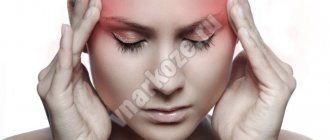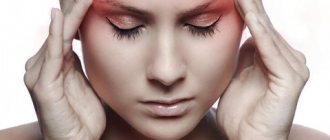Before menstruation, 75-90% of women experience irritability, mood swings, anxiety, and severe headaches. These are the main manifestations of premenstrual syndrome (PMS).
According to statistics, women suffer from PMS on average 72 days a year and 7 years throughout their lives.
Due to hormonal changes before the onset of menstruation, the condition of a woman’s entire body changes. The main causes of headaches during menstruation:
- Lack of progesterone. In the last days of the menstrual cycle, its amount decreases naturally, which leads to swelling, increased intracranial pressure and, as a result, pain in the head.
- Functional disorder of the nervous system. Under the influence of hormonal changes, migraine develops, which can be disturbing not only before menstruation, but also during it.
In the last phase of the menstrual cycle, 2-10 days before or during menstruation, a woman may experience the following types of pain:
- Pressure over the entire area of the head. The woman is bothered by a bursting, pressing sensation in the crown, forehead, and back of the head.
- Migraine. There is a pulsation in the eye area on one side. After a while, the sensation spreads to the forehead and crown. The condition worsens when talking or walking. Nausea, intolerance to sounds and light appear.
If you constantly have a headache before your period, you need to see a doctor to find out the cause. After interviewing the patient, he prescribes the necessary examinations:
- Monitoring hormone levels (follicle-stimulating, luteinizing, prolactin, estradiol, progesterone, testosterone, dihydroepiandrosterone).
- Ultrasound of the pelvic organs. Detects changes that indicate pathology in the production of hormones by the ovaries.
- ECG, echoencephalogram, MRI of the head, examination of the thyroid gland, kidney function. Allows you to exclude other pathological conditions.
Medications and alternative therapy can help get rid of pain in the head during premenstrual syndrome and menstruation.
Drug treatment
Headaches during menstruation can be successfully eliminated with painkillers (nurofen, aspirin), anti-migraine drugs (triptans, ergotamines).
If a change in hormone levels is detected, the doctor prescribes estrogen- and progesterone-containing tablets (combined oral contraceptives) or herbal-based medications (Remens, Mastodinon).
Complexes of vitamins B, A, C and minerals (magnesium, calcium, zinc) help strengthen the nervous system.
Non-drug treatment
- Nutrition. It is necessary to provide the body with sufficient energy. It is recommended to eat 5-6 times a day, daily caloric intake is 1200-1500 kcal, of which 50% are complex carbohydrates, 30% are proteins, 20% are fats.
- Herb tea. Mint, lemon balm, chamomile and rosehip have a calming effect.
- Aromatherapy. You need to apply a drop of lavender, sandalwood, eucalyptus or rosemary oil to your temple and rub.
- Massage. Both a relaxing general massage and massage of the cervical-collar area, self-massage help.
- Cold. Applying a cold heating pad or wet towel to the forehead for 15 minutes reduces pain.
Calcium helps reduce symptoms of PMS. To do this, it is enough to drink 1 glass of milk a day every day for a month.
Recommendations for preventing headaches before and during menstruation:
- Sleep at least 7-8 hours a day.
- Diet. It is necessary to exclude from the diet foods that can cause pain in the head: all types of canned food, frozen vegetables and fruits, sharp cheeses, chocolate, smoked meats, pickles, chips, red wine. It is advisable to reduce salt intake to eliminate swelling. Alcohol reduces the reserve of vitamins and carbohydrates, so it is not recommended for PMS. Coffee, strong black tea and other products that contain caffeine can increase irritability, so you should stop taking them for a while.
- Physical exercise. Walking in the fresh air for at least 30 minutes a day, morning exercises, and climbing stairs without an elevator strengthen the body.
- Use of vitamin-mineral complexes.
The choice of a headache remedy depends on the cause of its occurrence, frequency of occurrence, duration, and intensity. Drugs for headaches Main groups.
Before a change in the weather, weather-sensitive people experience changes in their state of health - heaviness in the head, headache, and drowsiness. Causes of headaches during shifts.
Nursing mothers often experience headaches. It is important to remember that during breastfeeding, most medications penetrate into the breast.
During pregnancy, there is a large load on all organs and systems of the expectant mother. The body works “for two”, creating a new life within itself. During the period.
Headaches during menstruation are a common symptom. Its appearance indicates possible disorders in the cardiovascular system, excretory organs, intestinal function or anemia.
The appearance of headaches during menstruation is characteristic of a number of unhealthy conditions. The disease is not diagnosed in the initial stage, but pain indicates the presence of pathological changes. What diseases manifest themselves as headaches during or before menstruation?
- vascular diseases: loss of elasticity, spasm of vascular walls;
- poor intestinal peristalsis, accumulation of deposits;
- osteochondrosis of the cervical spine;
- hormonal imbalance.
Read in this article
Headache during menstruation may be a consequence of vascular disorders. This is especially evident during menstrual periods due to excessive stress on the blood vessels. During menstruation, the body adjusts to excretion. Existing waste products are partially washed out and released into the blood. A general blood test during the menstrual cycle shows an increased level of ESR and the presence of inflammation in the body. A few days later, when menstruation ends, the blood composition returns to normal and the headache goes away.
During menstruation, the movement of blood through the vessels is activated. If the vessels are not elastic enough, they cannot respond to increased blood flow. There is a feeling of pain in the head.
Other vascular problems are associated with spasm (tightness) of the walls of blood vessels. Constant spasm of blood vessels causes oxygen starvation of the brain and migraines during menstruation.
Caffeine and aminophylline help relieve spasms and dilate blood vessels. That's why a cup of coffee is a popular remedy for headaches during menstrual periods.
Headache during menstruation may be a consequence of internal intoxication. During menstruation, waste products present in various organs are released into the blood. The body is cleansed. The blood flow accelerates in order to remove the resulting ballast. The blood discharges ballast and harmful substances into the intestines, where they are collected in feces and excreted during bowel movements. If the intestines are clogged with sediment, its peristalsis is weakened, and it is unable to fully remove toxins. Their reverse absorption occurs, the blood carries them to organs and tissues. This phenomenon is intoxication. Toxic substances from the intestines enter the brain, internal organs, and muscle tissue through the blood. That's why not only your head can hurt during your period. Weakness or aches throughout the body are often felt.
The physiological process of internal cleansing begins before menstruation. When the body cannot cope with the removal of toxins, the headache before menstruation is the same as during menstruation.
To reduce headaches, intestinal cleansing measures help: laxative herbs and cleansing enema.
Cervical osteochondrosis is the cause of frequent headaches during menstruation. With osteochondrosis, changes occur in the vertebrae: salt shoots (osteophytes) appear. They compress blood vessels (carrying blood to the brain) and nerve fibers (connecting the brain center with other organs). Between menstruation (which is physiological stress), the body adapts, pain is not felt. On critical days, the adaptive reaction is not enough. The brain and other organs require increased amounts of oxygen. And a compressed vessel is not able to ensure its supply. A headache appears.
Lack of oxygen causes dizziness and loss of consciousness. Dizziness during menstruation is less common, but is also a consequence of an exacerbation of an existing disease.
Menstrual headaches associated with osteochondrosis can be treated with a massage of the neck and shoulder area and exercises for the cervical spine.
Anemia is a blood disease. With anemia, there are not enough red blood cells (carrying oxygen) in its composition. Since the brain requires more oxygen on critical days, the effects of anemia are more pronounced and cause headaches. You can only get rid of pain with long-term therapy. To treat anemia with natural preparations, fresh green juice or green salads are used. They supply green chlorophyll, which is an analogue of the red blood cell molecule.
In some cases, the appearance of headaches during menstruation is a consequence of hormonal imbalance in a woman’s body. As a rule, such changes are observed after forty years. With the onset of menstruation, the production of hormones and their ratio changes, as a result of which blood pressure increases and fluid is retained inside the body. If tissue elasticity is insufficient (age-related changes), edema and hypertension occur. Due to edema, the brain is compressed and signals its own discomfort with pain (in the occipital and parietal regions).
A remedy for hormonal pain is diuretics, diuretic tea and herbs. They remove fluid and reduce headaches.
About critical days
Each woman's period week can be completely different. In some cases, this period proceeds without adverse symptoms, in others, a lot of unpleasant and even dangerous complications develop. Attacks of headaches during menstruation are a very likely sign of this physiological condition. There are several different ways to eliminate it.
During PMS, the functioning of the glands is often disrupted along with problems in the functioning of other organs. Symptoms can ultimately result in a wide variety of physiological signs. PMS causes significant blood loss, changes in hormonal balance and many other changes in the body. That is why it is very important to understand what to do when you feel dizzy during menstruation, as well as what medications can be used for pain. Only the attending physician should determine medications that will help get rid of PMS.
What to do in this situation?
Dizziness during menstruation, which is associated with premenstrual syndrome, is treated by a gynecologist.
During menstruation and two weeks before it, you must follow the following dietary intake:
- Reduce the amount of sweets - sweets, pastries, cakes
- Limit tea and coffee
- Almost completely avoid salting dishes
- Drink liquid in a volume of 2 liters per day, no more
- Eliminate animal fats and milk
- Completely avoid alcohol, which can retain fluid in the body and disrupt vascular tone.
Daytime naps and reducing psycho-emotional stress can also help. Physiotherapeutic procedures such as massage, balneotherapy and others have also proven themselves well.
Since the causes of premenstrual syndrome are associated with hormonal imbalance, if the above measures are ineffective, hormonal therapy is used.
Most often, oral contraceptives are used for this purpose.
Why are they effective?
Yes, because these drugs mimic normal hormone levels throughout the menstrual cycle. The duration of their use should be at least 3 months.
Knowing why this happens can help you deal with the problem. During the treatment process, you may need help not only from a gynecologist, but also from other specialists.
https://youtube.com/watch?v=481Mlqi2HPU
Do you still think that it is impossible to get rid of DIZZINESS?
Symptoms
Dizziness before menstruation is the most typical symptom, which occurs in almost half of women. In addition, many patients often feel sick during certain periods of the menstrual cycle. Against this background, a headache of varying intensity appears. The above is primarily influenced by some causes of headaches during menstruation, namely: changes in the concentration of sex hormones in the body. The content of estrogen and progesterone affects the appearance of adverse symptoms.
Dizziness during menstruation in itself rarely indicates the possible development of complications, but it still sometimes occurs.
A woman may experience symptoms such as:
- swelling of the whole body or individual parts;
- itching of the skin;
- development of depression or depressed mental state;
- numbness of the phalanges of the fingers of the upper extremities;
- increased blood pressure (BP);
- the appearance of tearfulness and irritability.
The period of critical days may be accompanied by some atypical signs of the syndrome. A woman needs to understand that her condition will be extremely unpleasant and difficult.
Symptoms may include:
- involuntary closure of the eyelids on one side;
- allergic reaction, up to the appearance of Quincke's edema;
- development of drowsiness - both during menstruation and before;
- the appearance of small ulcers in the mouth;
- vomiting during menstruation, which cannot be stopped by any means;
- the appearance of an inflammatory process in the eyes;
- severe migraine, etc.
Monitoring your health allows you to clearly determine the sequence in which signs of an unfavorable syndrome appear. This may ultimately help in identifying the causes.
Signs of menstrual migraine
Well-known signs that are present with menstrual migraine are pain in the temples in girls and women and in the lower abdomen. Such painful symptoms are accompanied by changes in the character and temperament of women. Irritability, irritability, nervousness, twitchiness, and lack of attentiveness appear. All this creates discomfort in everyday life, interferes with normal communication with others, a woman cannot work normally or lead a daily lifestyle. This is all explained by the fact that with all this, the understanding of new information decreases to ten percent. In medicine, such pain is called cephalgic pain.
The center of the headache is usually located in the temples and forehead, and this ailment can last for quite a long time. In this case, girls and women feel unpleasant pain in the eye area. High-pitched noise, din, conversation, bright light, sharp, rich aromas can irritate. This may be accompanied by an increase or decrease in venous pressure. And as a result, chest pain may appear, and the heart rhythm may become disturbed. Another significant symptom of ill health is unpleasant pain in the lower abdomen, aching joints, and back. The mammary glands may become much more sensitive, and body sweating may increase.
The occurrence of difficulties with the stomach and intestines in women during this period also happens quite often. Each woman is individual physiologically, so in particularly difficult episodes, nausea, bloating, and vomiting may be present.
Causes of headaches before menstruation
If you have a headache before your period, you should not immediately take a large number of medications, as it is important to determine the cause of the illness.
The problem may be:
- Violation of water-salt balance. Egg rejection often leads to some imbalance of salts and fluids in the body. Such changes in the body are accompanied by swelling of the limbs and face.
- Dysplasia, endometriosis and inflammation of the genital organs. All these diseases before PMS can significantly aggravate their typical symptoms, which affect the appearance of headaches.
Delayed menstruation in some cases causes unfavorable symptoms. Pain syndrome with such a problem is an uncommon occurrence, but it still occurs in some women before PMS. It is worth noting that pain in the heart area does not occur due to menstruation.
ethnoscience
During menstruation, what should you drink to relieve vertigo? If the doctor has not prescribed medications, then you can use traditional medicine recipes:
- Clover infusion, which is prepared from 20 grams of dry plant and a glass of vodka. It is infused for 2 weeks in a dark place and taken 30 drops 3 times a day.
- A decoction of 20 grams of dry lemon balm or St. John's wort and a glass of water is infused for an hour, and 50 ml is drunk three times a day.
- Plantain decoction, prepared from 20 grams of dry plant and a glass of water, drink before bed with a teaspoon of meadow honey.
- Brew a teaspoon of dry parsley seeds in a glass of boiling water. Leave overnight. Drink a third of a glass three times a day.
- Replace regular tea with an infusion of hawthorn fruits, which is infused in a thermos overnight.
- Make a dry mixture from a 100-gram pack of mint, half a pack of white peony roots and linden flowers. Leave 20 grams of this mixture in 500 ml of boiling water overnight. Drink 100 grams 30 minutes before meals.
- Brew 20 grams of dry nettle in 100 ml of boiling water. Let it cool, wrapping it up. After this, mix with natural apple juice and drink 50 ml 15 minutes before meals three times a day.
- Mix 10 grams of valerian roots and peppermint leaves. Pour in cold water (about 500 ml) and after boiling, cook for a quarter of an hour. Add a tablespoon of instant coffee and take a 30-gram shot 3 times a day.
- Enrich your diet with beetroot, pomegranate, and carrot juice. Drink plenty of ginger and linden tea with lemon balm branches.
- Introduce seaweed into your daily menu, which will saturate the body with useful substances such as phosphorus and iodine. Without them, the work of the vestibular apparatus becomes seriously complicated.
Dizziness before menstruation as a concomitant symptom is always unpleasant, but it becomes dangerous when it is accompanied by nausea and vomiting.
Do not ignore vertigo when it becomes a frequent companion to menstruation.
A visit to the doctor will allow you to identify its real cause and eliminate it, which will significantly improve your well-being and health.
Causes of headaches during menstruation
Many women are interested in the question of whether they can get a headache during menstruation. Such a consequence of this physiological state sometimes occurs.
This can happen due to reasons such as:
- Vascular diseases. When blood is lost, significant stress is placed on the arteries and veins.
- Anemia. The process of blood loss affects the number of red blood cells. Because of this, the oxygen supply to organs throughout the body decreases.
- Susceptibility to migraines. If a woman experiences constant severe headaches, they can increase significantly with blood loss. This leads to problems with other organs, which only aggravates the overall clinical picture.
- Osteochondrosis of the cervical spine. Increased blood flow in the body leads to the fact that the presence of problems with the spine is significantly aggravated. The result of this is severe headaches. Most often they are aching and dull in nature.
If your headache is quite severe on the first day, if possible, it is worth getting diagnosed at a medical facility. You can take medicine without a diagnosis only to eliminate an unfavorable symptom. It is important to understand that the cause of the disease will remain.
Folk remedies
- Infusion of meadow clover. To prepare it, 20 g of raw materials need to be poured with 250 ml of vodka and left for 14 days in a dark place. It is recommended to take the healing agent 30-40 drops 15 minutes before meals.
- Infusion of mint or lemon balm. To prepare the medicine, 20 g of raw material must be poured into 250 ml of boiling water and left for one hour. The drink should be consumed 60 g 4 times a day on an empty stomach.
- St. John's wort infusion. To prepare it, 20 g of the plant needs to be poured with 250 ml of just boiled water and left for two hours. The finished medicine is taken 80 g three times a day.
- Plantain infusion. To prepare a healing product, 20 g of raw materials need to be poured with 250 ml of just boiled water. Add 5 g of honey to the cooled drink. As a rule, the drug is taken before bedtime.
- Infusion of parsley seeds. To prepare it, you need to pour 5 g of raw material into 250 ml of just boiled water. This should be done in the evening so that the infusion is ready the next morning. The healing agent is taken 60 g 4 times a day half an hour before meals.
- Hawthorn drink. You need to add the berries of the plant to a thermos filled with boiling water. As a rule, the finished product is consumed as tea.
- Infusion of white peony root, mint and linden blossom. The components taken in a ratio of 2:4:3 must be crushed and mixed. In 20 g of raw material, you need to pour 500 ml of just boiled water and leave for 12 hours. The medicinal drink is consumed ½ glass 4 times a day 30 minutes before meals.
- Infusion of nettle and apple juice. Pour 150 ml of boiling water into 20 g of herb and leave for 4 hours, covering the container with a blanket. Next, the drink is filtered and mixed with fresh apple juice in a 1:1 ratio. The product is taken 50-100 g 3 times a day 15 minutes before eating.
- An infusion of peppermint, valerian root and instant coffee. To prepare a healing drink, the components in an amount of 10 g require 400 ml of water. The mixture should be allowed to simmer for 15 minutes. Add 15 g of instant coffee to the cooled drink. The resulting product is taken 20 g 3 times a day.
You can also include juices from fresh fruits and vegetables (beets, carrots and pomegranates), as well as tea with linden blossom and ginger. Before meals, it is recommended to eat two small branches of lemon balm or take 5 g of seaweed powder.
Seaweed powder is a source of iodine and phosphorus, and pomegranate juice helps increase hemoglobin levels and eliminate hypoxia. For depression, apathy and anxiety, the use of St. John's wort is recommended.
Teenagers are recommended to take fish oil, which helps relieve cramping pain.
Folk remedies for dizziness:
- mix rosemary essential oil and camphor in a 1:1 ratio and inhale;
- add 5 g of apple cider vinegar and honey to 250 g of warm boiled water; take the healing drink orally;
- Finely chop the onion and inhale the smell until tears appear.
So, dizziness that occurs during menstruation or after it ends requires consultation with a neurologist and gynecologist, since such a condition may indicate the presence of a serious illness.
Causes of headaches after menstruation
If you have a headache after menstruation, you need to pay attention to some of the possible ailments that accompany this symptom.
The main causes of the syndrome are considered:
- Intestinal problems. Weakened peristalsis leads to the fact that waste products, which are released into the gastrointestinal tract during blood loss, do not leave the body. As a result, additional stress on the body occurs. Unpleasant sensations occur in the abdomen, against which other symptoms of mild poisoning appear.
- Taking oral contraceptives. With their constant use, a very sharp drop in the level of hormones in the blood occurs.
Some blood diseases also become active after menstruation. This is due to the fact that a woman loses a very significant amount of various substances necessary for functioning during PMS.
Treatment
Your menstrual cycle can cause a wide variety of symptoms.
The following treatment methods are used as first aid:
- Weakness and dizziness, accompanied by nausea and vomiting, may decrease slightly when the woman has access to fresh air. In this case, the brain tissue is saturated with oxygen.
- If you feel dizzy, you need to take a few deep breaths. Sometimes this allows you to return to normal. This is due to the fact that more blood carrying oxygen flows to the brain.
- You can cope with unfavorable symptoms using a remedy such as 0.1% Atropine. To improve the overall sensation, just a few drops are enough.
- PMS headaches can in some cases be eliminated with the help of sedative medications. Doctors recommend using drugs such as Persen or Andaxin.
The main treatment for pain should depend on its cause and some signs of the problem. The method of therapy should be prescribed only by the attending physician. This may be a neurologist or a gynecologist.
A woman’s body responds well to medications such as:
- antihistamines;
- hormonal;
- medications to prevent nausea.
Violation of the water balance is eliminated by normalizing the drinking regime. You should take any medications with plenty of liquid. Taking hormonal contraceptives can be combined with the use of other means if there are no corresponding contraindications. Cerucal or Dramyl are most often used as anti-nausea medications.
Certain foods rich in vitamins and microelements can also help. Among them, the most effective in eliminating painful sensations are apples, buckwheat and liver.
High blood pressure is treated with standard antihypertensive medications. It is best to consult a doctor to choose a particular medicine. If problems with blood pressure are permanent, you can use medications previously prescribed by your doctor: Enalapril, Losartan, Hypothiazide, Corinfar, etc.
Tablets for menstrual pain such as Nurofen, Imet, Citramon and Ketanov can be effective. These drugs are intended to eliminate painful sensations. They can relieve cerebral vascular spasm and many other symptoms of the problem.
The safest alternative treatment for PMS pain is considered to be the safest. Alternative medicine involves the use of: meadow clover, mint and lemon balm, St. John's wort, plantain, parsley, white peony, linden, nettle, hawthorn, valerian, ginger and other medicinal herbs.
Types of dizziness
If you start your period and experience discomfort, it is important to correctly classify your dizziness. Because this will help to at least approximately identify predisposing factors and take the right measures
Central dizziness is caused by poor supply of brain cells and blood vessels with oxygen, and the appearance of swelling. Menstruation is accompanied by certain processes in the body, during which the blood vessels of the brain sharply narrow and dilate. Then my blood pressure skyrockets and I feel very dizzy.
Peripheral dizziness and menstruation have the most direct relationship. As a rule, it worries those who have pathological, inflammatory processes in the body.
According to the nature of occurrence, dizziness can be:
- systemic - dizzy every time menstruation arrives, such dizziness during menstruation has causes - disturbances in the activity of the vestibular apparatus, hormonal fluctuations;
- non-systemic - it is not always a concern, dizziness when menstruation begins or after it, but as a result of stress (overexertion, stress, intense training in the gym), with a lack of glucose in the blood.
Prevention
If headaches during menstruation occur quite rarely, you should not worry about it. In case of persistent symptoms, you must first follow all preventive rules.
Among them, experts identify the following:
- Reducing your intake of foods containing a lot of salt.
- Stop drinking alcoholic beverages. Even beer can cause headache symptoms.
- Normalization of work and rest schedules. Overwork significantly affects a woman’s condition.
- Take a contrast shower.
- You should massage your feet and cervical spine.
- If possible, you should exercise every day.
- Intense physical activity and serious sports should be temporarily suspended or reduced in intensity for women.
- Lifting loads should be limited to 10 kilograms.
Nausea and dizziness during menstruation can completely disappear, provided that the woman adheres to all of the above recommendations from doctors. If the symptoms do not disappear, you need to undergo an appropriate examination and diagnosis of the problem.
Preventive actions
You can prevent headaches that accompany menstruation by using healing procedures. Following these recommendations will help with this:
- regular cleansing of the gastrointestinal tract and liver using enemas (preferably based on herbal remedies);
- constant use of a vitamin-mineral complex that saturates the body with useful substances;
- balanced diet;
- active lifestyle and therapeutic exercises.
In case of severe manifestations of cephalic syndrome, medications are prescribed as prophylaxis: verapamil, propranopol, topiramate and others.
Take care of yourself, listen to the recommendations of doctors, and you will forget forever about headaches during such a difficult period for every woman, which happens once a month.











